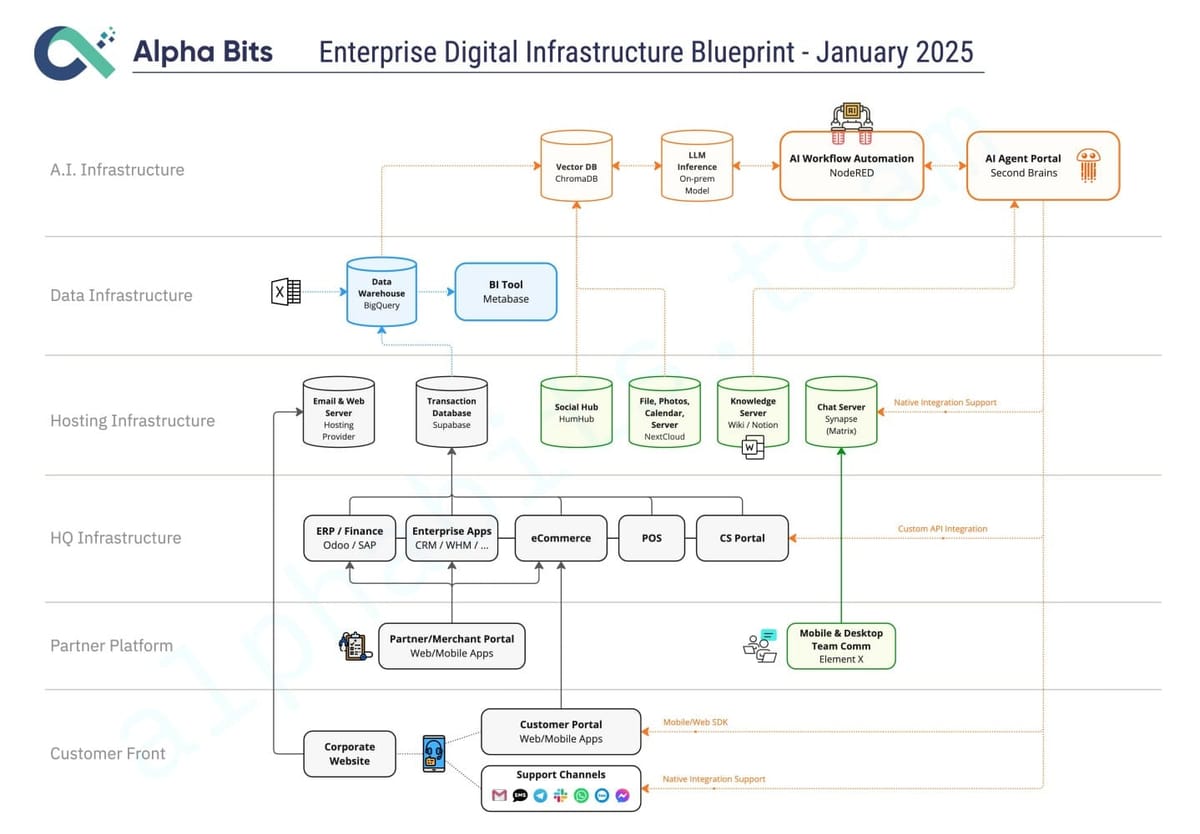Digital Transformation in a Nutshell, for CXOs
In 20+ years of driving digital transformation, I’ve learned one universal truth: "Technology alone doesn’t transform businesses — mindset does."

This diagram represents my team formula and checklist for a Digital Transformation (DX) project. It’s the culmination of 20+ years of working with startups, SMEs, and enterprises. Today, I want to share this with you, hoping it gives your team a definitive roadmap for a successful transformation in 2025.
The Buzzword Everyone Loves: AI
Let’s start with AI, what everyone wants to hear about. AI promises to revolutionize business operations, but here’s the truth: it’s still incredibly difficult for most non-tech businesses to implement effectively.
Why? Because AI thrives on clean, structured, and accurate data. Yet in most organizations I’ve worked with, this foundational data infrastructure for transactional, process-related, or knowledge-based doesn’t exist in the form needed for AI to succeed. So, where do we begin?
The Real Foundation: Data
Most SMBs and SMEs lack a clear strategy for technology adoption. Not because of negligence, but because the core focus has always been on running the business. Tech investments are often reactionary: a CRM for sales here, an ERP for finance there, a marketing automation tools thrown in later. Over the years, this results in a patchwork of disconnected systems:
- CRMs, ERPs, HRMs, WHMs, eCommerce platforms.
- Websites, internal apps, mobile apps, even TV apps.
What happens next is inevitable: messy data. Departments end up with their own silos, IT has limited control, and “data cooking” becomes a daily chore for reports sent to marketing, finance, and management.
What Really Is Digital Transformation?
In my experience, digital transformation is 30% a tech implementation project (e.g., setup Data Warehouse, automate data pipeline) and 70% about process reengineering, change management, and knowledge capture. It’s about creating a structured way for teams to collaborate and store project's context information, moving away from casual chats on Zalo or WhatsApp to centralized, accessible platforms.
This brings us back to the diagram above. The gray boxes represent typical enterprise systems, your transactional data generators. But more often than not, there’s no clear governance over who accesses this data and how it’s used. It’s usually free-for-all of ad hoc IT requests. Sound familiar? If so, your organization isn’t alone, you’re in the 99% spectrum that needs a proper Data Warehouse and Data Strategy.
The Goldmine: Data Strategy
Your data is gold, but extracting its value requires infrastructure and expertise. Here’s the first step:
- Invest in data storage and processing systems (cloud servers or SaaS).
- Build a data team or hire a dedicated Data Analyst to maintain and extract insights.
- Ensure clean, well-structured data pipeline that can support future upgrades, whether it’s a new ERP or POS system.
Why it matters: In 3-4 years, your tools and systems will change, even your CEO be a different dude, but your core data remains (financial reports, operational metrics). Investing in data strategy now ensures a solid foundation for the next decade.
The Future: AI Agents and Automation
Once your data platform is in place, the next logical step is AI-driven automation. Companies optimizing mundane tasks with AI agents will gain significant efficiency. For example:
Imagine running a hybrid retail chain with 10+ stores and an eCommerce platform. What if I told you a few AI Agents could cut your staff costs by 50%, handle 80% of customer service tasks, improve response time by many folds, and cost as much as a single senior employee’s monthly salary? While it sounds futuristic, your competitors are already exploring this. This is a typical project I take on, we start with discussion on savings by being more effective.
The Reality Check: Resistance and Mindset
Digital Transformation implementation isn’t easy. Resistance will come from all levels: employees, managers, and even leadership. Beyond technology, digital transformation requires a cultural shift.
• Teams must adopt documentation habits and centralized platforms.
• Processes need to be restructured to fully utilize new tools.
This isn’t about jumping straight to AI tools or expecting immediate results but creating the foundation for information to flow .
A Glimpse Into the Future
In my other ventures, we’ve already taken this transformation further:
• Digital Agriculture: Using Node-RED to control robots, monitor crops, and digitalize rice farming processes.
• Digital Energy Twins: Automating energy and water meters for factories and offices to optimize consumption.
The same tech stack applies: clean data, seamless integrations, and automation tools.
Nerdy Corner: AI Hallucination and Control
For CTOs reading this: managing AI’s non-deterministic behavior is a challenge. Our solution is divide and conquer. Instead of relying on the AI to handle end-to-end workflows, we:
• Break workflows into deterministic logic flows, if/else logics at the core.
• Use visual workflow automation tools like Node-RED to manage API calls and augment context for AI tasks.
• Build a robust knowledge management platform (we use Notion) to ensure the AI has a reliable memory, team members must also actively update the documents.
With this approach, we’ve been using multiple AI Agents for project management and departmental tasks, all while maintaining 99.9% control over outputs.
Also when we work with transactional Databases, AI Agents mostly use the clean aggregated reports from the BI systems as part of RAG; and of course augment those with templated SQL queries for realtime management questions. Fun fact: I learnt SQL from programming books in 1998, and I have been using it actively the last several years in my work.
Final Thoughts
In 20+ years of driving digital transformation, I’ve learned one universal truth
Technology alone doesn’t transform businesses — mindset does.
If you’ve made it this far, thank you for reading. If you’re ready to take the first step in transforming your organization, let’s talk. We’ll build 6-12 months roadmap tailored to your business goals, we want to help your team truly evolve in Tech capabilities.
Drop us an email or DM me, and let’s make 2025 your year of transformation.
I run Alpha Bits Team and several other ventures.




